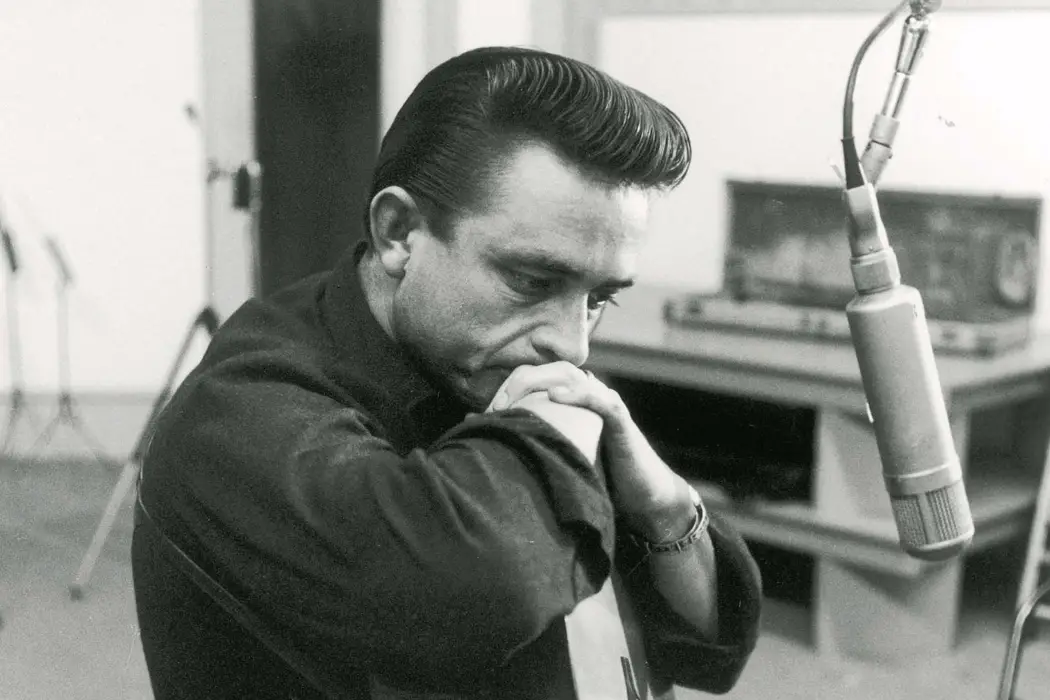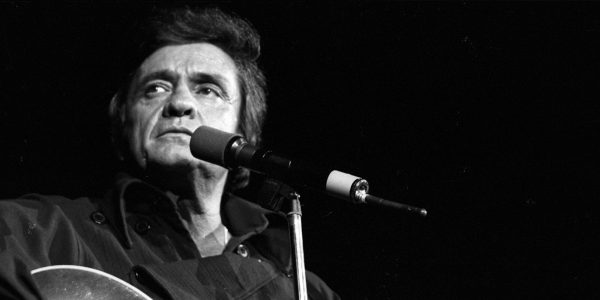THE GIFT: THE JOURNEY OF JOHNNY CASH: A Meaningful Portrait Of Sin & Salvation

Tynan loves nagging all his friends to watch classic movies…
I hear the train a comin’
it’s rollin’ round the bend
and I ain’t seen the sunshine
since I don’t know when…
The words are unmistakable from the first moment you hear them. The deep voice reverberating with sorrow. The touch of spare grittiness and simple instrumentation. They’re evident hallmarks of Johhny Cash’s career and “Folsom Prison Blues” is a keen reminder of what has made him such a lasting purveyor of the American mythos.
If The Gift is about the journey and redemption of Johnny Cash, one of the kairos moments the film posits revolves around this song. Director Thom Zimny‘s latest documentary positions the concert at Folsom Prison and the titular tune at the crossroads of the icon’s path. It’s a symbol of his indelible brand of “rustic, raw and primitive art” as the man who sang gospel songs and empathized with the prisoner and the addict. It captures a duality in his life, ever-fluctuating between “sin and salvation.”
But it also becomes a fitting way in which to remember his legacy. Because “The Man in Black” has been gone for quite some time (He passed in 2003), and yet it seems like he still captures the public imagination, even to this day. Every time I hear a new anecdote or listen to one of his many tunes ripe for rediscovery, my admiration for him continues to grow.
If Folsom Prison is any indication, it has nothing to do with a manicured image. What shines through is the pure authenticity of his humanity. The very fact he acknowledged his doubts and his demons and laid them bare before all of us through his life and through his music.
A Boy Named John
It’s not too difficult to fashion Johnny Cash‘s childhood as one of calling from an early age. He was enamored with listening to the radio, which brought so many folk and country tunes into the family living room. The romanticized characters in the songs spoke to him even as his father said his countless hours in the front of the inanimate box were a waste of time.

His early years were characterized by a hard and lean existence on a farm in the wake of the dust bowl. His family was fortunate to have land but hardly well-off, and the man of the house was at best, distant, and at worse, an abusive husband.
The real love and affection in Johnny‘s life spilled out of his big brother Jack — the bright spirit who died tragically in a freak accident. The core wound would stick with Cash for a lifetime. But it was also Jack who encouraged him in his singing; it was Jack’s presence he felt with him moving forward, and nothing was going to impede this sense of preordained calling. He was born to sing.
Further On Up The Road
In the early 50s, Cash was stationed as a code interceptor with the Air Force in Germany. It seems like a minor detail though even this is weaved into his musical career – the fact he became ever more in tune with cadences and rhythms – and of course, during this time he was penning songs. What’s more, he was alone in a world that felt constricting and utterly isolating.
On his return, marriage followed as well as a contract with the visionary founder of Sun Records, Sam Phillips. It was at this early juncture in his career Cash began to take amphetamines and barbiturates to maintain the furious pace on the road. What’s most perturbing is the realization his lifelong drug problems started with pills prescribed by doctors in an era where it seemed perfectly normal. He also met June Carter, the bright-eyed, multi-talented member of the famed folk-singing Carter family, providing its own complications – as anyone who’s seen Walk The Line might know.

It was the 60s that truly shaped his image with the America public as he released a prolific number of concept albums including Ride This Train, Blood Sweat and Tears, and Ballads of The American Indians. What stands out is how unapologetically American he is, but there are also deep wells of empathy throughout his catalog. His attempts to come to terms with his country’s sullied relationship with Native Americans is one prime example.
Even as his popularity grew, The Johnny Cash Show, which aired on ABC, is a visible testament of who he was as a man. In an industry very self-conscious about appeasing viewership and promoting groomed images of stars, Cash put out a show filled with real music performed live and no preconceived labels. Everyone was welcome from Joni Mitchell and Eric Clapton to Ray Charles and Stevie Wonder.
The Gift does not often set Cash‘s narrative in the broader cultural context – it’s not interested in placing him in a quasi-political setting – like Tricky Dick & the Man in Black. Still, in a nation rife with discord and unrest, what a cheering portrait it is suggesting what can be created through the unifying power of music.
Hurt
But like any complicated, highly visible performer, there was also a violent side to Cash. He admits it was brought out of him by the mood-altering drugs, including a notorious outburst at the Grand Ole Opry in 1965. In the accompanying interviews, he confirms being busted 7 times. What’s even more sobering is when he admits to often downing a case of beer a day with hundreds of pills just to keep the cycle going as his first marriage continued to deteriorate.

In what feels like another storybook moment, Cash recounts how he wandered into a cave in Chattanooga Tennessee intent on giving himself up to God. He walked as far as he could and his light ran out as he fell down to die. But off in the distance, a light came toward him through the darkness: It was June Carter. She would become his lifelong partner, but she may as well have been a guardian angel sent to save him. It’s positioned as a redemptive even spiritual encounter of a man leaving the darkness behind and going toward the light.
During the 1970s, he made his faith even more public and became a family man as he had never been before. In response, record sales tanked. Although his quality of life went up, eventually the 80s brought another trough – a new rock bottom – with renewed addiction and crippling strains on his marriage to June. That could have been the end of the story yet again. Thankfully it was not.
The Gift of Johhny Cash
The documentary does well to provide formalistic parallels to Cash‘s journey and the voice he was blessed with. There’s a spareness to its pairing of images with the audio from interviews. There are no cutaways with talking heads pulling us out of the moment needlessly. We’re getting a fully engaged, uninterrupted look into the life and journey of Johnny Cash. Emmylou Harris, Bruce Springsteen, Jackson Browne, and then family members, like John Carter Cash and Roseanne Cash, all get input, but they are only accents to the broader narrative. The final cornerstone is Johnny Cash himself telling his own story.
If it’s not apparent already, “The Gift” of Johhny Cash, in his own words, was “singing, writing for [his] voice, that’s the gift.” The fact he could take the lines he wrote and, using his God-given mouthpiece, transform them into contemporary poetry reaching out to the masses. He and Bob Dylan might be the closest thing we have to modern-day folk heroes.
Because even when he interpreted someone else’s lyrics, he somehow molded them in such a way, they always felt like his own. And even as his voice aged with new cracks, it managed to reflect his current state and the onerous road he had traveled thus far.
I’ve recently been reminded of how integral the language of imagery and metaphors are to how we make sense of the world as human beings. The Gift is built around such archetypal ideas because Cash‘s own hero’s journey almost necessitates them. Life is a journey down a road – a train ride we take across the tracks – a bus route to a destination yet unseen. It is an ongoing saga between light and darkness. This is the type of imagery that he embodied lyrically, emotionally, and, some would say, spiritually.
Bruce Springsteen even admits offhand rock stars often have a Messianic complex. I’m not sure if the exact same could be said of Cash, but his moniker as the eponymous “Man in Black” about sums it up. It’s his version of a Christ-like life, to stand as a testament to the poor and the prisoner, the sick and the lonely. If we’ve ever been any one of those people, Johnny Cash is a friend of ours, because he has been there too. He was always the drifter, the wanderer, the outsider, just like us.
I couldn’t help but be reminded of his rendition of Tom Waits‘ gospel-infused “Down There By The Train.” Cash‘s vocals make it ring with the same universal transparency he imbued his entire career:
Well, I’ve never asked forgiveness and I’ve never said a prayer
Never given of myself, never truly cared
I’ve left the ones who loved me and I’m still raising Cain
I’ve taken the low road and if you’ve done the same
Meet me down there by the train
Down there by the train
Down there by the train
“The Gift” of Johnny Cash is how he brings us into his struggles, into his journey, and lets us be a part of it with him. It’s an open invitation. Maybe someday we’ll meet down there by the train. It’s not exclusive. Anyone is welcome. All you gotta do is go towards the light.
Do you have a favorite Johnny Cash song? Why do you think he’s such an iconic figure? Please let us know in the comments below.
The Gift: The Journey of Johnny Cash was released by YouTube on October 11, 2019.
Does content like this matter to you?
Become a Member and support film journalism. Unlock access to all of Film Inquiry`s great articles. Join a community of like-minded readers who are passionate about cinema - get access to our private members Network, give back to independent filmmakers, and more.
Tynan loves nagging all his friends to watch classic movies with him. Follow his frequent musings at Film Inquiry and on his blog 4 Star Films. Soli Deo Gloria.












